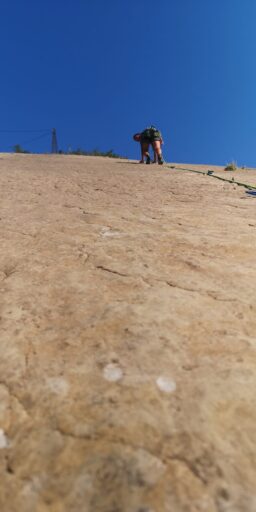Home Office with a difference
A work-life adventure report by Chiara Westphal.
What initially went through my mind:
- Home Office generally works surprisingly well.
- Yay! You can travel relatively well within Europe again.
- Unlimited vacation – Yes well, but actually my tasks and the whole development of the current projects are much too exciting not to pursue them myself now.
Quiz question: what was I offered to write the latter statement?
1. A pay raise.
2. No punches for a change.
3. Neither. I really feel that way.
Nothing, but we are a cult in disguise whose criterion for joining is some manifestation of insanity that leads to the conceit that work could be fun.

Headed south on the moped!
Result from the above thoughts: I just combine everything and call it home office special weeks. No sooner said than done. So I grabbed a friend (who is self-employed and has the flexibility to work remotely), a motorcycle, climbing and mountaineering gear, booked a few weekend or half-day kayak tours, and headed to the Alps for three weeks.
Week 1: I am writing up the daily plan of being able to use the proximity to the mountains as a partial success. The weather was crappy. An important release was pending. That, to the chagrin of my companion, kept my workload and time at a constant high. In addition, there were small things I had not considered. It is exhausting for all involved when I participate in a web conference from the common room of an accommodation without a headset. – I bought a new headset. Likewise, it is stupid when the accommodation writes that they have WIFI, but it is practically unusable. – I took out a new cell phone contract with a larger mobile data volume. The next few weeks went much better.
My conclusion: these were definitely not the last home office special weeks!
It is interesting at this point to think about everything that has contributed to this conclusion. First and foremost, of course, I had fun. All my hobbies were waiting for me practically at the front door.
Before I started, however, I thought about how well I could create a balance. The balance between accessibility and efficiency and, on the other hand, games, fun, and joy. Of course, it has been explicitly communicated in the team so far that it essentially doesn’t matter when and how much everyone works. The main thing is that the tasks are completed and if not, that that information is communicated appropriately. Nevertheless, it’s an interesting experiment to see what happens when you completely ignore common notions of core working hours.
Even if the timing was rather unfavorable, I think that the first week with the release was very important for proving that we could fully rely on each other. I knew it was important, so I was there. From the second week onwards, I tended to arrange my working hours according to the weather. It’s quite unconventional to first communicate when you’ll be available the evening before or sometimes even on the same day. On sunny days I only worked on important and/or urgent tasks. Of course, this led to the fact that I worked less time overall than I would usually do in the office. Time and again, this led me to ask myself very consciously: is everything going as it should? Yes? Then I can take time off.
An experiment wouldn’t be an experiment if you didn’t also have doubts. It was clear to me that I also had to do small things that I would normally have simply worked on with two hours more time. In this respect, one always weighs up in the background whether what one is doing is sufficient. Because one could achieve considerably more if one worked eight hours instead of four. It’s not just me who notices this, but everyone. The communication within the team was extremely pleasant: when in doubt, just ask if there’s anything left to do.

At this point, I would also like to say a big thank you to my friend Basti, who followed my initially not-very-flexible work schedule for three weeks. He played a major role in making it such a great trip.
My cautious request for two spontaneous vacation days in the third week led to the climax of clearly noticeable trust/flexibility/responsibility for myself. The response was: “Yeah, sure. You’ll be able to assess for yourself if that works. Let me know if you still need help rescheduling.” For the colleague, it was really good that I was so far away. Otherwise I would have cuddled him to death in the subsequent rush of euphoria.
In summary, I would rate the whole thing as a complete success. My colleagues have been incredibly accommodating and understanding. Many thanks to you peers for that! It was also interesting to see how well I was able to concentrate in any environment.
If you’re still in the mood for an excerpt of my personal travel highlights, below are my top 3 work vs. play experiences.
Third place
In week 1 (continual mixed weather) the sun did show up for a while. During this time, I was waiting for information from a colleague. It was about the go ahead to test the new status of a test instance. I asked another colleague to call me as soon as something could be done. In the meantime, I went climbing.
I found the experience of having an official, albeit short, conversation on the third pitch of a climbing route very exhilarating… I could not have imagined this combination of activities before.

“Hello?!…No, note taking is bad right now…no, I can’t even quickly grab a piece of paper…!”
Second place
Full-day workshop from a pub in South Tyrol.It was loud. Fortunately, however, everything was tuned so that my share of speech was minimal. Nevertheless, concentrating on listening demanded a lot from me. It got really good when other guests found me increasingly entertaining. Basically because I sat there with my PC and headset and slurped (really great) pasta on the side. Throughout the meeting, I happily declined four or five invitations to buy me a Grappa. (I know, unnecessary. It would not have made the web conference worse, after all. ^^) During the workshop, one of the waitresses cheerfully yelled across the room, “You work? No! Holiday, holiday!”
When a guest then held his cell phone with a running video call with his father in front of my nose. He cheerfully told me something (neither of us spoke a language that the other could understand, but it didn’t seem to matter). I thought it was an appropriate time to carefully bow out of the situation. (Unfortunately, I nevertheless did not drink Grappa with the other guests then. Because I still had a four-hour motorcycle trip over the old Brenner Pass ahead of me).

Saturday and Sunday the weather was borderline to mixed, which kept the tension level quite high. Nevertheless (or maybe because of that) we had a great trip. But were also very happy that everything had worked out and we did not have to bivouac somewhere in the rocks.
First place
From Saturday to Monday, we toured numerous via ferratas through the Brenta. On Monday, only the descent remained. Since that was only supposed to take four to five hours, I made a business appointment for the afternoon.The first part of the descent went faster than expected. So we deviated from the original route plan and chose a path past a lake. Only two kilometers away, a lift was supposed to then take us further. We assumed that the new route should not take longer than planned.
Arriving at the lift, it was easy to see that it was not running. We had a brief exchange with an employee of the station. He was of the opinion that the fastest way for us to get down was cross-country below the cable car.. Interesting suggestion. So we tried to run as fast as possible down a slope inclined at about 60 degrees, through all kinds of wet brush.
One good thing was that due to the rather high vegetation, we usually fell relatively softly. Everytime when we stumbled into one of the numerous holes in the ground. Because this was so much fun, I decided to cross a hiking trail (instead of following it) and walk downhill alone for about five kilometers in a partly wrong direction. My companion and I arrived in the valley about three kilometers apart. There, both to find that there was no reasonable means of transportation (other than a cab, perhaps) that could have gotten us to the car. So we both hitchhiked. It worked out by chance that we arrived at the car at almost at the same time. In the end we were on time (there was still this appointment to meet) in the car on the way back to the accommodation. At this point I would like to quote my buddy, who reacted quite incomprehensibly to my tense attitude: “What’s wrong? It all worked out, didn’t it?”






This Post Has 0 Comments